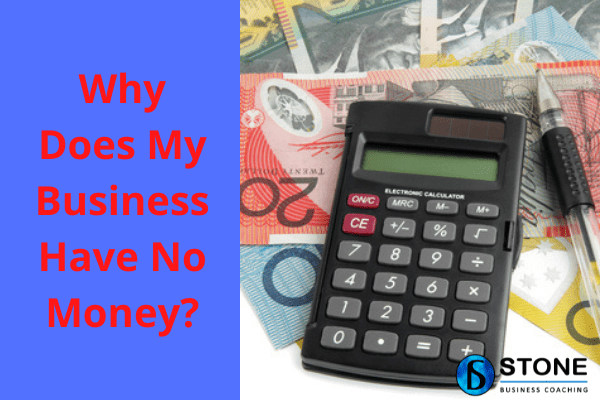You ask, why does my business have no money? If you’re working hard, then you can likely eliminate the lack of business (or business leads) as the dilemma. It’s presumably not about your marketing, so you wonder “what are we doing wrong?” Well, it might not be what you’re doing wrong, it might be a heap of different components and I’m going to mention a few; but this is not 100% of all possibilities. What is important is that you are tracking and measuring and looking at profit.
Why My Business Have No Money
1. Are your figures right?
Before you start stressing or worrying about your profit or money situation, have a good look at them and ensure they are right. Over the decades I’ve spent working with Aussie businesses, I can say I’ve seen lots of silly but important errors done in bookkeeping and record keeping. If your figures are not accurate, then you cannot make an informed decision. May I say also you should, as a business owner, review your figures at the very least once a month. It’s amazing how many small business owners who don’t review their financial reports regularly. The reasons range from lack of knowledge to lack of time or simply forgetting. I’ve done business coaching with clients who don’t understand their figures and I’ve given them ‘training’ so that they are able to be all over their reports.
2. Do you understand your reports?
As I said, it’s important as a business owner to review your financial reports, but as important is that you have a basic understanding. For example, some expenses or outgoings do not go onto the P&L statement. One example is a loan or HP. Also when you buy an asset (that is not eligible for an immediate write off) this also won’t hit the P&L statement. The same applies to any personal money the business owner spends from the business bank account. This also goes directly to the Balance Sheet. That means, that a number of items, where money is coming out of the bank do not show in your P&L. So it looks like you’ve “made” lots of money, but in fact, an amount less so. Also, understand that just because something gets invoiced (and if you’re doing accruals reporting will then show on the P&L) that doesn’t mean you’ve actually got it. You might wait 3-4 months to be paid, or might not be paid at all!
3. Are you all over collections?
One big part of ‘having money’ is your cash flow and making sure that the people you invoice actually pay you and pay you promptly.
4. Is everything invoiced?
Have you remembered to invoice everything? It might sound obvious but I know things slip through. It might be variations, an invoice missed, or even a whole month of invoices which occurred and no one in this quite large business noticed the entire month’s invoicing was forgotten. That is, until a few months later and the cash flow was really difficult.
5. Do you have waste in your business?
Well, if we’re being honest, every business has a degree of waste. It might be product, materials, labour or something else. The important thing is to minimise your waste to keep it as low as possible. Eliminate errors and cut back on waste. Ensure processes are efficient and effective so that you’re not always fixing things, or spending time on duplication. Every business is different, so as an experienced business coach, I’m often digging quite deep to find the true waste factor in a business.
6. Is Your Pricing Right?
Are you charging the right amount for your product or service? Being all over your pricing and quoting is really important. Once you factor in the cost of running a business (ie overheads) is there profit at the end of the day? If you factor in labour costs, how accurate are you with that figure? Beyond including super and workers’ insurance, is there anything you’ve missed? What about downtime (but the staff are still paid), admin time, leave entitlements and other non-productive time such as non-chargeable travel costs? What about the time you provide to a client but don’t charge? What about your staff’s time to get a client on board and get them started with you? If you are product-based, remember also the cost of warehousing, manufacture, shipping etc, plus again of course overheads. It is not as simple as you purchased the product (or pay someone for an hour of work) for $x and add your usual mark-up.
Also, there is consideration of what your competition is charging, your perceived value and what the market will wear. How busy are you? A busy business often won’t discount; they don’t need to (and it’s frequently wise not to). I know some operators (particularly single operators) will work backwards and say they want to earn a certain amount, so decide by weeks and hours to come back with a charge out rate. They do just need to still watch they’ve covered their business costs.
Finally, around pricing, comes the confidence to charge what you are worth. You know what you should charge, but that little voice at your ear says “no-one will pay that”. Stop listening to that destructive little voice. I was only talking to a client yesterday who I’d worked with a few years back. We were talking about pricing and she reminded me about something I’d told her years ago. If we allow clients to treat us poorly, or allow them to underpay us, then we deserve them. Whilst we consider our competitors and their pricing, ultimately it’s up to us to determine what our fee structure will be. If you communicate excellence and great value, you will less likely have to squabble over a few bucks.
7. Did you get the GST right?
The last and final point for this blog is getting GST right. Again, with it being around so often you’d think we all have this nailed … but there are still business owners not handling GST right, or not adding it in the right spot in their quotation procedures.
When it comes to business coaching, it’s far more than just motivation or accountability; I will go through all these sorts of things with clients who need help in this area. Once you know what you want your pricing to be then there is a right or wrong way to increase your pricing – if that’s the direction you are taking. Check out my blog – How to Price Your Service. Feel free to reach out to me if you’d like to talk about my Australia wide business coaching services – doesn’t matter if you’re in Sydney, Melbourne, Perth or Brisbane – I’m here to help.







